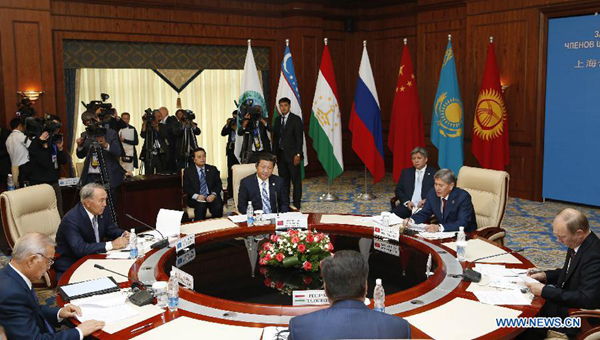SCO summit promotes regional stability, cooperation
 0 Comment(s)
0 Comment(s) Print
Print E-mail Xinhua, September 14, 2013
E-mail Xinhua, September 14, 2013
|
|
|
The 13th Shanghai Cooperation Organization (SCO) summit is held in Bishkek, Kyrgyzstan, Sept. 13, 2013. (Xinhua/Ju Peng) |
Shanghai Cooperation Organization (SCO) leaders conducted in-depth exchanges of views and reached broad consensus on issues such as good-neighborly relations and key global and regional affairs during the bloc's 13th summit that closed Friday.
The meeting of the SCO Heads of State Council was held at a time when international and regional situation was getting increasingly complicated and the SCO was faced with fresh opportunities and challenges.
Analysts said that the summit will provide added impetus to safeguard regional security, deepen economic cooperation and improve people's livelihood and advance the sound steady development of the regional bloc.
SECURITY COOPERATION REMAINS TOP PRIORITY
Cooperation on security, which has been one of its key tasks since the SCO was founded in Shanghai in 2001, will remain the bloc's top priority and primary objective for quite some time in the future.
In a joint declaration issued here on Friday, the SCO leaders called for concerted efforts to fight international terrorism, separatism, extremism, transnational organized crime and other illicit activities and improve the legal basis for cooperation in these areas.
Zhang Xinfeng, director of the Executive Committee of the SCO's Regional Anti-Terrorism Agency, said that the "three evil forces" (of terrorism, separatism and extremism) tend to propagate religious extremism and recruit more followers via the Internet and are highly interconnected with drug trafficking, weapons smuggling and organized crime.
He said that the organization will strengthen its ability in processing information and coordinating the cyber security agencies of member states to fight against the "three evil forces."
Confronted with the complicated international situation, SCO members have adopted common positions on a series of hot-spot issues and made known to the world their strong resolve to safeguard regional security and stability, advance regional development and prosperity, establish a more equitable international order and promote world peace and development.
On the Syria issue, the member states expressed their grave concern and advocated that the region should achieve peace, stability, prosperity and progress without external interference, especially the interference of force, unauthorized by the UN Security Council.
They also voiced support for putting the chemical weapons under the supervision of the international community and suggested Syria join the Convention on the Prohibition of the Development, Production, Stockpiling and Use of Chemical Weapons and on Their Destruction.
MORE FOCUS ON ECONOMY, HUMANITY COOPERATIONS
The pragmatic cooperation among SCO members is currently on a fast track, fueled by the twin engines of economic and security cooperation.
In the past decade, the SCO has made remarkable achievements in regional economic cooperation. With trade scale grown and cooperation mechanism established, members states also witnessed creation of the Entrepreneurs Committee and the Inter-bank Association as well as a batch of infrastructure projects in energy, traffic and telecom fields.
Chinese President Xi Jinping proposed in Astana last Saturday that China and Central Asia join hands to build a Silk Road economic belt to boost cooperation.
The proposal was warmly welcomed by other members. They pledged to expand trade scale, facilitate investment, lift regional communication and shore up traffic, energy and information network infrastructure.
They also called for a quickly show-up of a multilateral financiers to better fund the cooperation projects.
In the regard of humanity, summit participants unanimously agreed to promote cooperation in education, sports and tourism among others.
They also pledged to continue the cultural exchange to to build stronger public support for the regional cooperation.
PLANNING LONG-TERM DEVELOPMENT
At the summit, SCO leaders approved a framework to implement the Treaty on Long-Term Good-Neighborliness, Friendship and Cooperation. The framework is essentially important for SCO's healthy development, for it will guide its members to promote political mutual trust and conduct in-depth pragmatic cooperation.
Chinese Vice Foreign Minister Cheng Guoping said that the framework confirms nearly seventy cooperative measures in over twenty domains, and sets a five-year plan for cooperation from cementing interstate relations to implementing projects.
In line with consensus reached by the leaders, the SCO plans to launch cooperation in law enforcement departments between member states and observer states this year.
Such cooperation is expected between member states and dialogue partners in 2014.
Those steps are conducive to build consensus and joint efforts.
Being an important member of SCO, China plays a big role in propelling the group development and its internal cooperation. In light of the developing regional situation, China raised many proposals for SCO's development, which were recognized by the relevant parties.
Dmitry Mezentsev, SCO's secretary general, believed that the group has been well-developed in all directions during the last twelve years which is not a long time in a historical range.
In the coming years, scales, contents and level of the cooperation among SCO members will further develop, said Mezentsev, asserting that it has a bright future.






